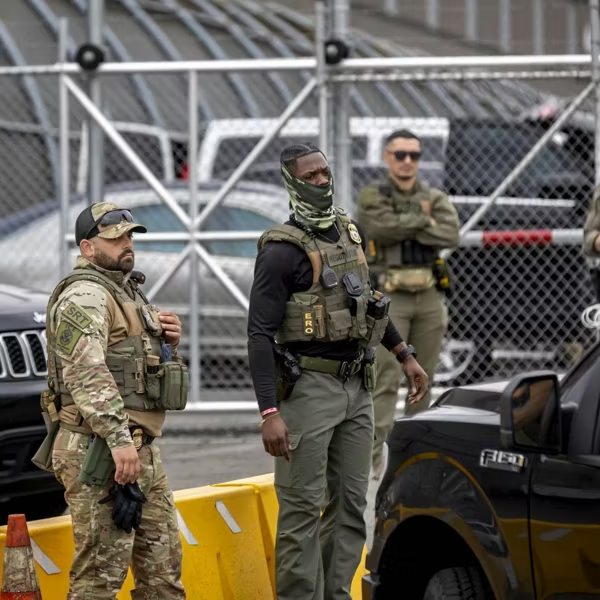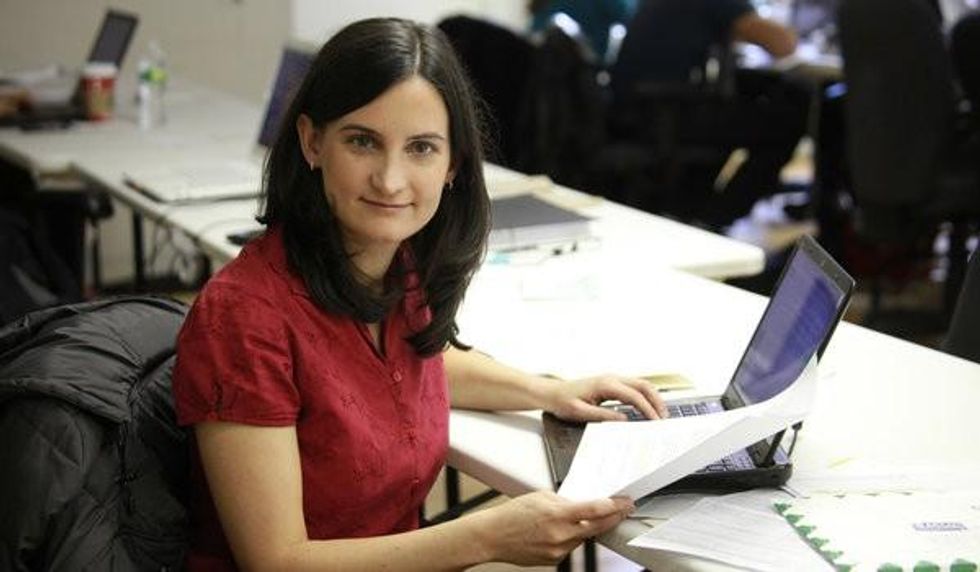Whenever I speak about the systematic abridgment of basic rights in the post-9/11 era, there is a point I try to make that is quite elusive yet, in my view, of unparalleled significance in understanding the implications of allowing this to happen. When a government is permitted to transgress the limits that have been imposed on its power (in the case of the US, imposed by the Constitution), the relationship between the government and the citizenry changes fundamentally.
In a free society, those who wield political power fear those over whom the power is wielded: specifically, they harbor a healthy fear of what will happen to them if they abuse that power. But the hallmark of tyranny is that the opposite dynamic prevails: the citizenry fears its government because citizens know that there are no actual, meaningful limits on how power can be exercised. A nation in which liberties are systematically abused - in which limitations on state power are ignored without consequence - is one which gives rise to a climate of fear.
This climate of fear, in turn, leads citizens to refrain from exercising their political rights, especially to refrain from posing meaningful challenges to government authority, because they know the government can act against them without real constraints. This is a more insidious and more effective form of tyranny than overt abridgment of rights: by inducing - intimidating - a citizenry into relinquishing their own rights out of fear, a state can maintain the illusion of freedom while barring any meaningful dissent from or challenge to its power. Here's one four-minute video clip where I describe a personal example to illustrate how this pernicious fear climate operates; here's another slightly longer video clip where I elaborate on this point more.
The true measure of how free a society is how its dissidents are treated, not those who refrain from meaningful anti-government activism and dissent.
This morning, the New York Times reports on the US government's practice of targeting US dissidents - or those whom it believes to be engaging in dissent - with extremely invasive border searches, including seizing (and sometimes keeping for months) their laptops and other electronic data, all without any warrants. I've reported many times before on this practice and won't repeat any of that here. Instead, I want to highlight several of the examples provided by the Times as it underscores so powerfully how this climate of fear functions:
" Laura Poitras, a documentary filmmaker and the recipient of a 2012 MacArthur Fellowship, estimates that she has been detained more than 40 times upon returning to the United States. She has been questioned for hours about her meetings abroad, her credit cards and notes have been copied, and after one trip her laptop, camera and cellphone were seized for 41 days.
"Ms. Poitras said these interrogations largely subsided after a Salon article describing her experiences was published in April, but she is editing her latest film in Europe to avoid crossing the border with her research and interviews. (The film, the third in a series about the war on terror, focuses on domestic surveillance.)
"'I'm taking more and more extreme measures, to the point where I'm actually editing outside the country,' she said.
Just think about that. In addition to the credentials listed by the Times, she produced a 2006 film that documented the actions and motives of anti-US insurgents in Iraq, one that was nominated for an Academy Award for Best Documentary, and then produced a second film on radicals in Yemen. She's now working on an expose of the US surveillance state and how domestically invasive it is, featuring a whistleblower, William Binney, who was an NSA official for 32 years (several months ago, the Times published an eight-minute preview clip of that extraordinary film, for which I was interviewed by Poitras).
So here is a highly accomplished documentarian who has produced two films and is working on a third - all of which, in one way or another, pose challenges to US policy. Despite the fact that she has never been charged with, let alone convicted of, any crime, she has been subjected to serial invasion and harassment by the US government - so much so that she is now afraid, quite rationally, of being in her own country while editing her film.
As she has conveyed to me for that article I wrote in April, Poitras is afraid to talk on a US telephone to anyone involved in her project, travel into her own country with any materials relating to her film work, or physically keep any of her unedited film on US soil. Does that sound like the behavior of a citizen and a filmmaker of a free country? Then there's this, about another US citizen:
"Pascal Abidor, who is studying for his doctorate in Islamic studies, sued the government after he was handcuffed and detained at the border during an Amtrak trip from Montreal to New York. He was questioned and placed in a cell for several hours. His laptop was searched and kept for 11 days. . . .
"Mr. Abidor said he had also changed his travel patterns: because he is regularly detained at the border, he keeps little data on his laptop and rents a car when driving back to the United States from Canada, so he is not stranded waiting for the next train. Still, he said he experienced 'a near panic attack' every time he returned to the United States.
"'I have not done anything illegal, nor have I tried to hide anything I've done,' he said. 'I've told them where I've traveled. I'm studying something that's legal. I learned a language millions of people speak. I don't understand how a variety of legal acts can lead to suspicion.'"
Abidor is a US citizen (he also holds French citizenship). His parents live in Brooklyn, and he was traveling to visit them the first time this happened. He has never been charged with any crime, nor notified that he is suspected of one. But, obviously for good reason, he is now petrified of traveling into his own country, refrains from flying or taking a train, and feels compelled to erase almost all data from his laptop - all because he is studying to be a scholar in Islamic studies and is learning Arabic. As he put it previously:
"As an American, I've always been taught that the Constitution protects me against unreasonable searches and seizures. But having my laptop searched and then confiscated for no reason at all made me question how much privacy we actually have. This has had an extreme chilling effect on my work, studies and private life - now I will have to go to untenable lengths to assure that my academic sources remain confidential and my personal dignity is maintained when I travel."
Does that sound like a citizen and academic of a free country? Then there's this example, perhaps the most amazing one from today's Times article:
"A laptop belonging to Lisa M. Wayne, a criminal defense lawyer, was searched after she returned from a trip to Mexico.
"Ms. Wayne said her main concern was the information about clients' cases stored on her laptop: she is a past president of the National Association of Criminal Defense Lawyers, which is a co-plaintiff in the Abidor suit, along with the National Press Photographers Association. But at the time of the search, she was unaware of her rights and felt pressured to hand over her computer.
"'It was very clear to me that the longer I objected or interrogated them, the longer I was going to be detained, and I had a connecting flight,' she said. 'It's an intimidating experience. It was not consensual other than, you comply with the rules.'"
Even a former president of the National Association of Criminal Defense Lawyers is sufficiently intimidated by these measures that she reacted only with paralysis and compliance: she just dutifully handed over her laptop to government agents to search through and copy at will. And it requires little prescience to understand the message being sent here to other lawyers or activists who challenge government policy: if someone in Wayne's position can and will be subjected to these invasions, who won't be?
Laptop seizures are far from the only tactic employed by the US government to put government opponents in a state of fear and thus deter others from engaging in similar dissident conduct. That is also the aim of measures such as the unprecedented persecution of whistleblowers; the prosecution of Muslim critics of US foreign policy for "material support of terrorism", the targeted FBI entrapment and "preemptive prosecution" of US Muslims, NATO protesters, anarchist activists, and others with ideologies the US government dislikes; and - most of all - the ubiquitous surveillance state.
What makes this tactic particularly effective is that it will not affect those who have no interest in engaging in real dissent against the government. If you're not a filmmaker who challenges the prevailing government narrative (Poitras), or a scholar trying to understand rather than demonize currents in the Muslim world (Abidor), or a lawyer involved in groups suing the US government for unconstitutional behavior (Wayne), or an activist advocating for WikiLeaks and working to protect online anonymity and thus thwart government spying and control of the internet (Jacob Appelbaum), or someone who supports Bradley Manning's legal defense (David House), then you're not going to be subjected to this sort of intimidation and rights-invasions, and it's thus easy for you to simply assume that it does not exist.
In essence, the bargain offered by the state is as follows: if you meaningfully challenge what we're doing, then we will subject you to harsh recriminations. But if you passively comply with what we want, refrain from challenging us, and acquiesce to our prevailing order, then you are "free" and will be left alone. The genius is that those who accept this bargain are easily convinced that repression does not exist in the US, that it only takes place in those Other Bad countries, because, as a reward for their compliant posture, they are not subjected to it.
But even in most of the worst tyrannies, those who are content with the status quo and who refrain from meaningfully challenging prevailing power systems are free of punishment. Rights exist to protect dissidents and those who challenge orthodoxies, not those who acquiesce to those orthodoxies or support state power; the latter group rarely needs any such protections. The effect, and intent, of this climate of fear is to force as many citizens as possible into the latter group.
The true measure of how free a society is how its dissidents are treated, not those who refrain from meaningful anti-government activism and dissent. To apply that metric to the US, just look at what the American citizens quoted in this Times article this morning are saying and doing.




